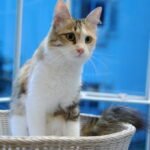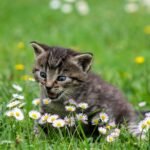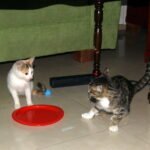Have you ever noticed your cat acting a little odd when you give attention to someone else? Maybe they suddenly appear on your keyboard when you’re trying to work, or they start vocalizing loudly when you pet another animal. These aren’t random behaviors – they’re actually clear signs that your feline friend is experiencing jealousy.
While cats might seem aloof and independent, the truth is they form incredibly strong bonds with their humans. Cats can experience jealousy, although it might not look the same as it does in humans. Research shows that what we perceive as jealous behavior in cats is actually often better described as a combination of territorial behavior, resource guarding, and attention-seeking.
So let’s dive into these fascinating feline behaviors that reveal just how much your cat truly adores you.
They Physically Insert Themselves Between You and Others

Many people think that cats are displaying jealousy when they try to get in between you and whatever you are doing. This classic jealous cat behavior involves your feline literally positioning themselves between you and the source of their perceived competition. Physically pushing between their owner and the source of jealousy, such as sitting on laps or blocking access is one of the most common signs of feline jealousy.
Your cat might dramatically flop onto your laptop while you’re working, plop themselves directly on your book while you’re reading, or squeeze between you and another person during conversations. This isn’t random attention-seeking – it’s strategic positioning to maintain their special bond with you and ensure they remain the center of your world.
Excessive Meowing and Vocalization

Excessive vocalizing is another sign of a cat who is upset or stressed, so some jealous cats may act in this way. When your cat feels their position as your number one companion is threatened, they’ll often resort to increased vocal communication to regain your attention.
This might manifest as loud meowing when you’re on the phone, persistent yowling when visitors arrive, or dramatic vocalizations when you interact with other pets. Jealousy in cats often manifests as behaviors like hissing, growling, increased vocalization, blocking access, or attention-seeking actions. Your cat is essentially saying “Look at me! I’m here! Don’t forget about me!”
They Become Extra Clingy and Affectionate

Some cats express their jealousy by seeking attention from their owners. They may crowd your space, cuddle next to you, rest on your lap, and ask for pets more often than normal. This clingy behavior is your cat’s way of securing reassurance that they’re still your favorite.
Your cat or dog seems extra clingy, following you everywhere and licking you. They try to stop you if you try to do anything that doesn’t involve them. You might notice your normally independent cat suddenly becomes your shadow, following you from room to room and demanding constant physical contact whenever you’re home.
Destructive Behavior Around the House

Destructive behavior may pop up with cats clawing at things or knocking them over. When cats feel jealous or insecure, they sometimes express these emotions through destructive actions that are designed to get your immediate attention.
Destructive actions like chewing furniture, knocking over items, or shredding household objects become your cat’s way of saying they’re not happy with the current situation. This behavior often intensifies when new pets or people enter your home, as your cat tries to reassert their dominance and importance in your life.
Aggressive Behavior Toward Perceived Rivals

Hissing, growling, swatting, or scratching at objects, animals, or people they see as rivals is a clear sign of feline jealousy. Your cat might display aggression specifically toward the person or animal they perceive as competition for your affection.
This could include hissing at new pets, swatting at visitors, or even showing aggression toward family members who seem to be getting more of your attention than usual. Cats get very jealous. They can be jealous of other cats, other pets, and often other people in the household.
Inappropriate Elimination Outside the Litter Box

Marking territory outside the litter box or spraying to claim spaces important to them is one of the most problematic signs of cat jealousy. When your cat feels their territory or relationship with you is threatened, they might resort to inappropriate elimination as a way to mark their claim.
This behavior often occurs in areas that smell like you or near spaces where the perceived rival spends time. If you see them peeing or pooping in places where they shouldn’t, they may be trying to tell you something. It’s your cat’s way of saying “This is mine, and you belong to me.”
Hiding or Withdrawing From Family Activities

Other cats react to negative emotions by hiding or evasive behavior, so if your cat sneaks off or avoids other members of the household, those actions can also be clues that a cat is feeling jealous. Not all jealous cats become aggressive or attention-seeking – some respond by emotionally withdrawing.
Not all cats show jealousy in the same way, of course… More reserved felines might ignore their meals or hide away from everyone. You might notice your usually social cat suddenly spending more time under beds, in closets, or other secluded areas when they perceive competition for your attention.
Increased Grooming and Self-Soothing Behaviors

Some cats who are upset will groom excessively, so this behavior change can be a useful barometer of your cat’s emotional state. When cats experience jealousy-related stress, they often turn to excessive grooming as a self-soothing mechanism.
This might manifest as over-grooming specific areas of their body, creating bald patches, or spending significantly more time on grooming activities than usual. It’s your cat’s way of coping with the emotional stress they’re experiencing when they feel their special bond with you is threatened.
Food Guarding and Resource Competition

Competition for resources such as food, toys, or affection can trigger jealous behaviors in cats. Your cat might suddenly become possessive of their food bowl, toys, or favorite resting spots when they feel competition for your attention.
If you have multiple pets, dining etiquette can suddenly become an issue. Your cat may feel jealous of their food and begin to behave defensively if they believe another pet is trying to eat it. This resource guarding behavior is your cat’s way of protecting what they perceive as limited resources in a competitive environment.
Attention-Seeking Performances and Show-Off Behavior

Does your pet start trying to show off? Some jealous cats will engage in dramatic attention-seeking behaviors that are designed to win back your focus. This might include performing their cutest tricks, bringing you gifts like toys or prey, or engaging in exaggerated playful behaviors.
Cats sometimes will lie down on your work table or sit on your computer keyboard to get attention, or even start knocking things off the table. Your cat is essentially putting on a performance to remind you of how wonderful and entertaining they are compared to their perceived competition.
Scent Marking and Territorial Claims

Jealousy may present as resource guarding, aggression, scratching and biting and also attention seeking, scent marking, rubbing on the object of focus and lying on top of it. When cats feel jealous, they often increase their scent-marking behaviors as a way to claim territory and reassert their bond with you.
This includes rubbing against you more frequently, head-butting you repeatedly, or even marking objects that belong to their perceived rivals. Cats are emotionally intelligent animals capable of forming deep attachments. Jealousy is a sign that your cat values your presence and feels threatened by changes to their environment or social group.
Conclusion

Understanding these signs of cat jealousy helps us appreciate just how deeply our feline companions care about their relationships with us. According to experts, jealous-like behaviors in pets typically suggest boredom or a ploy for attention from their owners, but they also reveal the emotional depth of our cats’ attachments.
Remember: your cat isn’t being difficult – they’re trying to communicate. Listen, respond with compassion, and the bond you share will only grow stronger. The next time your cat exhibits these behaviors, remember that it’s actually their way of saying “You’re the most important thing in my world, and I don’t want to share you.”
What do you think about these jealous cat behaviors? Have you noticed any of these signs in your own feline friend? Tell us in the comments.




